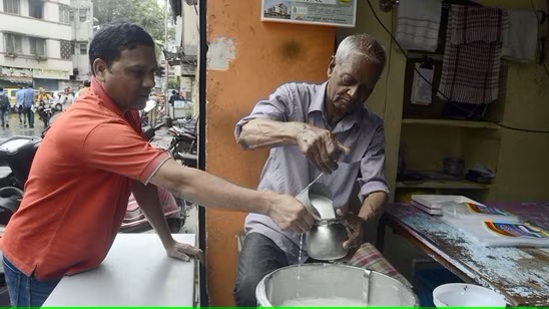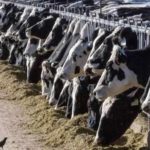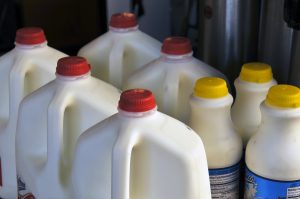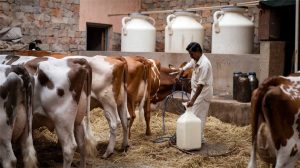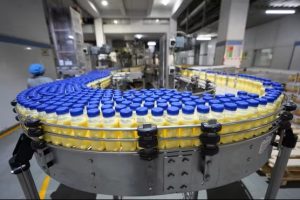
The stifling heatwave and acute water scarcity in several parts of southern India has led to a fall in milk production prompting dairies to raise procurement prices, cooperatives and dairy farm unions confirmed to HT. The yield has dipped by up to 15% in March 2024, compared to the same period last year, milk federations in Karnataka, Andhra Pradesh, Kerala, and Tamil Nadu said. While Tamil Nadu’s Aavin has reported a fall of five lakh litres per day to collect 25 lakh litres in March this year over March 2023 numbers accounting for a 15% shortfall, the state-wise reduction in procurement by Kerala’s Milma is 11% for the March this year, officials from the federations said.
Several measures to protect cattle from extreme heat and guard farmers’ margins have been undertaken by both state-owned and private dairy cooperatives to help the farmers until the crisis passes and monsoon arrives.
KS Mani, Chairman of the Kerala Cooperative Milk Marketing Federation said, “We are reaching out to the panchayats and local administration officials to supply water to the dairy farmers through tankers so that the cattle can be fed and bathed. Milma has decided to jointly bear the cost of the tanker and transportation, if any, with the panchayat to ensure farmers’ needs are taken care of.”
Dairy farmers in Kerala’s Wayanad and Kasargod, districts that border Karnataka, have reached out to the federation for assistance after high temperatures hit Kerala in March. A previous rise in above-normal temperatures was reported only in parts of Kerala five years ago, the official said.
In Karnataka, large milk unions in Mandya, Mysore, Chamrajnagar, and Kolar have begun using fans to offer some respite to the cattle and are wrapping wet gunny bags around cows to cool them down. However, a surge in power tariffs and a fall in water levels could leave the farmers with fewer options to explore.
Falling water levels and milk production
A mercurial atmosphere coupled with a drought-like situation has only led to more distress.
A fall in water levels coupled with poor fodder stocks has left dairy farmers in a quandary. “Cows produce less milk in summer. It is a biological phenomenon because they eat less and drink more water. But the onset of early summer and a sudden temperature rise is affecting cattle adversely,” said HN Prashanth, owner of Sai Gokulam Dairy from Mandya. Prashanth says that with every two-degree rise in temperature, a fall in yield is seen. Cows of Indian origin (Gir cows) on average give about 20 litres of milk per day and the upkeep of the animal costs about ₹250 – 300 per day including the labour and fodder costs. Water scarcity has already begun impacting the cost of maintaining cattle since the beginning of March, farmers in the southern states have reported to their federations.
In the twin districts of Mysore and Mandya, farmers have reported a 25-30% drop in production already, according to Mymul (Mysore Milk Union). The unavailability of water has reduced green fodder cultivation with inter-district and inter-state fodder movement restricted by the state government due to the prevailing drought situation. About 15 varieties of grass comprising leaves and other grains are fed to cattle. But a shortage in fodder is now being replaced by paddy husk, husk of grains, and coconut cakes, dairy farmers that HT spoke to across states said.
To abate this crisis, farm unions have collectively decided to use less water to clean cattle and sheds, avoid unnecessary wastage of water, and prevent pump sets in villages from overflowing. “Many farmers have also decided to cut down on harvesting other crops such as paddy and sugarcane cultivation because these crops need a lot of water. They have instead decided to divert use of water to grow fodder,” Prashanth said. Dairy farmers fear the heat could take a toll on the cattle’s lives. Farmers have begun administering Zinc and Magnesium pellets adding them to the fodder as supplements to compensate for any loss in nutrition due to dehydration or poor eating.
Impact and intervention
To compensate the farmers for plummeting production, state and private dairy cooperatives have increased the milk procurements in Andhra Pradesh and Kerala from March. Since Andhra Pradesh consumes more buffalo milk compared to cow milk, procurement prices have been increased by ₹1.30, the managing director of a private cooperative dairy in Guntur spoke on conditions of anonymity.
The private dairy operates in Guntur, Chittoor, East and West Godavari, Nellore, Prakasam, Kadapa, and Anantapur districts and its data in March shows a dip in milk production in Guntur and Chittoor districts clearly. The official said that the extreme heat could have a residual effect on low lactation for the next four to six months with the situation easing only around September. “We are also supporting our farmers by giving fodder for their cattle. We will assess the situation internally before taking a call on whether or not to extend this additional increment and the duration of it,’’ the official said.
The price hike came masked differently in Kerala. What started as a festive season hike soon turned into a heatwave compensation. Milma paid ₹5.50 additionally per litre of milk in March to its one lakh plus dairy farmers in the state. “Given the heatwave and the festive season of Easter and now Vishu, we foresaw an increase in consumption. To compensate the farmers adequately, we procured milk paying this additional price,” KS Mani said. A litre of milk in Kerala is procured at ₹46.50 paise. In addition, Milma has covered its dairy through the Heat Index-Based Cattle Insurance scheme offered by the government-owned Agriculture Insurance Company of India (AIC). For April and May, Milma has paid a premium of ₹90/cow to the ACI from its Cattle Development Fund. The dairy farmer will be compensated ₹200 per cow per week if the temperature is higher than the set benchmark for a week and ₹2000 per cow per month if the temperature remains above normal for over 25 days. The insurance scheme to protect dairy farmers from climatic change was introduced last year and farmers from Kasargod and Kannur districts received a compensation of ₹29 lakh as against a premium of ₹14 lakh paid by Milma from the AIC, KS Mani said.
While Kerala and Andhra Pradesh have taken proactive steps to ensure cattle farmers, Karnataka and Tamil Nadu are assessing the situation, Karnataka Milk Federation and Aavin officials who spoke to HT said. The KMF official who did not wish to be named said that the federation procures nearly 75 lakh litres of milk from the unions per month and the drought-like situation has led to a 10-15% drop. “We will take appropriate measures after the election since we are not allowed to announce any schemes now,” the official said. Karnataka’s KMF is southern India’s largest milk procurer and has ample stock of milk powder to not affect the demand-supply dynamics, the official said.
Tamil Nadu’s hesitation in increasing its procurement prices comes from the recent increase in cow and buffalo milk procurement rates. Chief Minister MK Stalin hiked prices by ₹3 in December 2023 and the dairy farmers are paid ₹38/litre for cow milk and ₹44/litre to encourage farmers to supply more milk to Aavin than to private players.
Rajesh Kumar, general manager, Aavin (Dairying) said, “Though the milk production has dropped across the state, there is no acute water shortage in Trichy, Tirunelveli, and Viluppuram are milk shed areas in Tamil Nadu. The severe flood in Tamil Nadu last December has restored groundwater levels and villages have not yet sounded an alarm.” The official said that he expects the citation to improve by the end of May when the calving season starts and more milk is produced by expectant cows.
But is the procurement price rise affecting margins? Officials from private and government-owned dairy cooperatives say they see an increase in the sale of ice creams and fermented products such as curd, buttermilk and lassi. “An increase in volume in the next two months will offset the loss we incur in procuring milk at a higher price,” the official from Andhra’s Guntur dairy cooperative said. The onset of the south-west monsoon is expected to offer a let up in both rising temperatures and prices.
Deepika Amirapu is a freelance journalist based in Hyderabad. Each week, Southern Lights examines the big story from one of the five states of South India.
You can now read the most important #news on #eDairyNews #Whatsapp channels!!!
🇮🇳 eDairy News ÍNDIA: https://whatsapp.com/channel/0029VaPidCcGpLHImBQk6x1F
